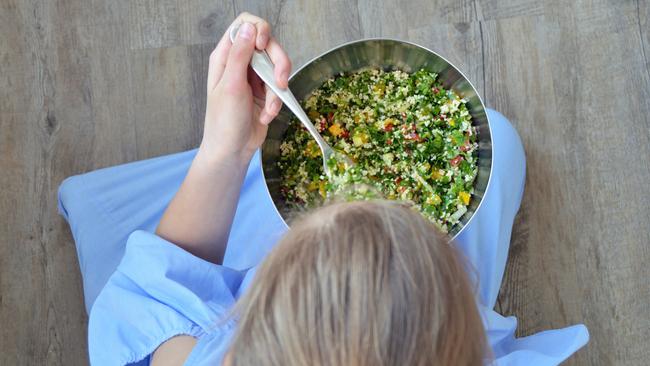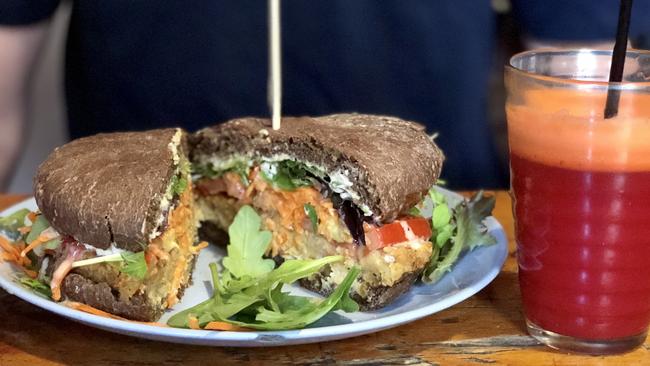What vegans eat, the benefits and effects it has on your body
While it’s not a new concept, veganism has garnered lots of attention of late. But what exactly is it and what does it do to your body?
Eat
Don't miss out on the headlines from Eat. Followed categories will be added to My News.
Veganism isn’t a new concept, but it’s attracting a lot of attention right now.
Yesterday hundreds of vegan protesters hit the streets of Melbourne with signs and banners reading “vegan rising” and warning of the “dire straights” of animals, the planet and humanity.
But what exactly is veganism?
It’s a stricter form of vegetarianism that means no meat, poultry or fish and nothing that has been taken from meat such as lard.
Vegans also don’t eat animal products, including eggs or dairy products and usually honey too, and wearing products derived from animals is also avoided.

MENU SWAPS
Vegans substitute products of animal origin with plant-based foods such as vegetables, fruits, whole grains, nuts and seeds.
According to Sydney-based nutritionist and author Susie Burrell, vegan diets can be balanced and nutritious, but it is important adequate amounts of iron, Vitamin B12 and protein are consumed.
”Most vegans will require a certain amount of planning each day and targeting core foods such as fortified milks, legumes, nuts and seeds to get the right mix of nutrition every day,” Ms Burrell told news.com.au
The average serve of meat, fish or chicken contains 20-30g of protein compared with a cup of legumes or wholegrains containing 8-15g.
“Animal-based proteins contain the full range of amino acids, the form of proteins that are readily utilised in the body compared to some plant proteins which may only contain a limited number of these essential amino acids,” Ms Burrell said.
“For this reason, vegans need to make sure that each of their meals and snacks contain at least one protein-rich food.
“But also that they are consuming complete proteins either via combining different types such as corn and beans together or choosing complete plant-based protein sources including quinoa, chia and buckwheat.”
NUTRITIONAL COMPARISONS
According to the Dietitians Association of Australia (DAA), a piece of grilled, beef rump steak with its fat fully trimmed is 31.7g with protein/100g; chicken breast, baked, lean but with skin is 27.9g with protein/100g; and white snapper brushed with olive oil, grilled is 27g with protein/100g.
What does a vegan have to eat to get the same amount of protein?
• Tofu, hard (may vary depending on brand): 12g protein per 100g. You would need 200g tofu to get 24g protein
• Tempeh: 19g protein per 100g. You would need 150g tempeh to get 27g protein
• Chickpeas, drained: 6.3g protein per 100g. You would need 400g chickpeas to get 25g protein
• Almonds 100g: 38.41g protein per 100g
• Cashews 100g: 29.73g protein per 100g
• Tahini unhulled: 24g protein per 100g — 1 tablespoon is 15g
It is important to note that the above values are approximates and are not a complete list of suitable vegan protein
“Actual intake should vary depending on individual needs and should be recommended by an APD”, a DAA spokesperson said.
THE BENEFITS AND EFFECTS
Vegans say not only is there an environmental benefit to their approach but also health benefits, such as improved gut health, reduced risk of heart disease, type 2 diabetes and cancer.
Dr Ambika Satija, of the Department of Nutrition at the Harvard T.H. Chan School of Public Health, examined the dietary data of about 209,000 adults across two decades.
According to her research, which was published in the Harvard Medical School’s Harvard Health Publishing in 2017, people who followed a healthy plant-based diet had the lowest risk of heart disease, with their bodies also looking a lot leaner.

This included eating whole grains, fruits, vegetables, nuts, legumes and healthy oils.
But those who followed an unhealthy plant-based diet — fruit juices, refined grains, fries and sugar-sweetened beverages — had a substantially higher risk of heart disease.
“While this study didn’t look at which animal foods, especially meat, could have an impact on heart health, other research has shown that, as with plant foods, the type and amount matter most,” Dr Satija said in the report.
“For instance, a study in the January 2017 American Journal of Clinical Nutrition found eating three ounces of unprocessed red meat three times per week did not worsen blood pressure and total cholesterol levels.”
However, Dr Satija explained a 2014 study from the American Heart Association showed men aged 45 to 79 who ate 75g or more per day of processed red meat, like cold cuts, sausage, bacon, and hot dogs, had a 28 per cent higher risk of heart failure compared with men who ate less than 25 grams.
Ms Burrell told news.com.au that, in particular, active adults and women (especially those who are pregnant or breastfeeding) and children needed specialised nutritional advice from a dietitian to ensure all key nutrient groups were adequate.
“Now while veganism does have its benefits, it can also change your intake of protein quite considerably, and as such, it is not simply a matter of cutting out the meat and dairy from your diet.”
Dr Penny Adams, from Sydney, said some nutrients were only found in animal foods — such as vitamin B12, adding vegans may also be at a higher risk of calcium, iron and protein deficiencies.

CHECK YOUR CALCIUM
If you plan on converting to veganism, it is important to check your calcium.
Ms Burrell said plant-based milks including soy and almond milk were readily available in both supermarkets and cafes, but it was important to remember they can be much lower in protein and calcium than dairy-based milk.
“For this reason always make sure you are choosing fortified varieties of plant milk that ideally contain both calcium and Vitamin B12, and keep in mind that nut-based milks, in particular, are much lower in protein and calcium than dairy and even soy milk. Other vegan-friendly sources of calcium include nuts and seeds, leafy greens and tofu.”
EXPLORE VEGAN-FRIENDLY MEAL OPTIONS
While it is easy to eat salads, pasta and veggie stir fries when you are vegan, Ms Burrell warns not to forget the growing range of vegan-friendly meal replacements such as Quorn.
“Not only do these help to expand your food variety when you are eating vegan, but nutritionally, they can be rich sources of nutrients and protein,” Ms Burrell said.
SOME FACTS:
• Australia ranked number one for searching the term vegan on Google in 2018
• 44 per cent of Australians report going meat-free at least once a week, according to Nuzest
• By 2020, Australia’s packaged vegan food market will be worth $215 million
Originally published as What vegans eat, the benefits and effects it has on your body



